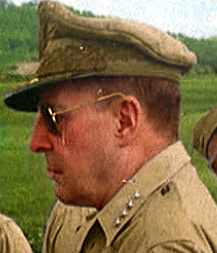
Next job for MacArthur poses political problem
Americans in Pacific are on the move, and new decisions must be made soon
By George Weller
George Weller is recuperating in the United States from illness suffered after spending several years in the Southwest Pacific.

Gen. MacArthur
The two MacArthurs – presidential possibility and Pacific generalissimo – are moving solely into a new focus as a result of the transpacific drive toward Truk by the U.S. Navy.
While adherents of the general’s presidential candidacy are driving hard on his behalf in the United States, the changing pattern of war is throwing into question what his new duties in the Pacific will be.
However separate they ought to be, Pacific and presidential drives are commencing to mesh wheels.
As long as Gen. MacArthur’s forces had not yet reached Rabaul in their two drives up the Solomons and the island of New Britain, it might with justice be said that he had not yet attained milestone No. 1 on his journey back to the Philippines.
Japs weakening
But now Rabaul is weakening.
Fighters over its volcanic harbor are growing less, none having been seen in the last seven daily raids.
And in the Navy’s vicious strike at Truk, there is an anticipation that this stronghold may soon be taken by the hard driving task force under Adm. Nimitz which the Japs have left unchallenged.
As Truk approaches neutralization, Rabaul’s defenses against Gen. MacArthur decline.
Most, if not all the Jap fighters – the yardstick of resistance in airpower – come down the system of island stepping stones from Japan through the Bonins and Carolines, via Truk to Rabaul. If Truk goes, Rabaul cannot be far behind.
Political aspects
When Rabaul goes, two elements begin to appear in the campaign by Gen. MacArthur’s supporters for the Presidency which have hitherto been lacking, namely:
-
From having been a hero only, Gen. MacArthur becomes a victorious hero.
-
The immediate aim in a military sense of Gen. MacArthur’s drive for the past two years is achieved, and it becomes a matter of decision on the part of his superiors, Gen. Marshall and President Roosevelt, what duties are to be assigned to him next.
The first element is most important to those Republicans who are anxious to have a strong, and not merely a martyred MacArthur, as their candidate.
It is the second element which deserves closer study.
Below the spearhead of the Navy’s transpacific drive, whose goal Adm. Nimitz says is “bases in China” and which necessarily involves first bases in the Philippines, there are two zones of Jap conflict, the “Southwest Pacific,” which takes in all Australia and the Dutch East Indies, and the “South Pacific” which takes in New Zealand and the intervening islands up to the Solomons. Two years ago, Gen. MacArthur was ordered out of the Philippines to take command of the former and last year the latter was also committed to his care, as the two zones converged on Rabaul.
What is next?
However, Gen. MacArthur’s drive has never recovered any territory west of Australian-mandated New Guinea.
The entire left flank of the Southwest Pacific has remained exploited only by harassing raids by long-range bombers.
Being topped by the Navy’s drive on his right flank, with Adm. Nimitz moving westward in between him and the Philippines, what will Gen, MacArthur next be told, after the fall of Rabaul, to do?
It is almost certain that whatever his next orders tell him to aim at, they can be interpreted, by those who wish to do so, as having political significance.
Three possibilities
There are, roughly, only three possibilities of what may be done by Washington with Gen. MacArthur:
If progress by the Navy continues to be rapid into the mandated islands, he may be assigned the Army and air side, possibly even a stronger command in this drive toward the Philippines.
He may be asked to mount an offensive on his western flank, through the Arafura Sea and Indian Ocean where Timor and the Kei, Aroe and Tenimbar Islands were all captured by the Japs after the general had assumed command in Melbourne. This assignment would be important, for it eventually would involve cutting off the Japs from important oil sources. But it would be difficult, for the western and northern coasts of Australia are inhospitable places for mounting an amphibious invasion.
Gen. MacArthur might be transferred out of the Southwest Pacific and given a command elsewhere. Such a command, to be in line with the general’s only expressed military hopes, would have to be on a Jap front.
Short of an overall command of the whole Pacific War – a step that could not be taken without a careful sounding of Navy susceptibilities – the only front left is China.